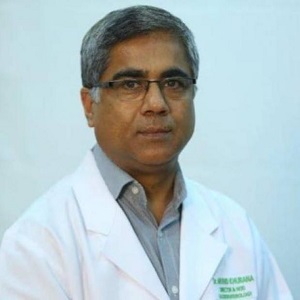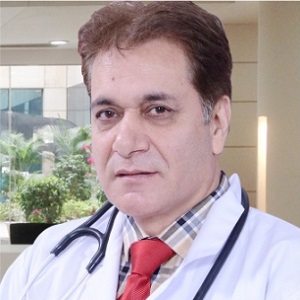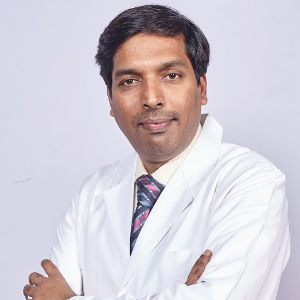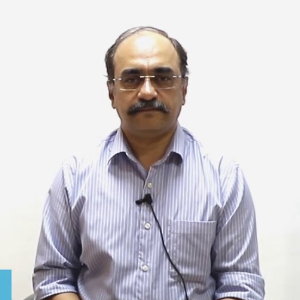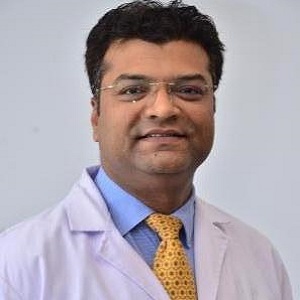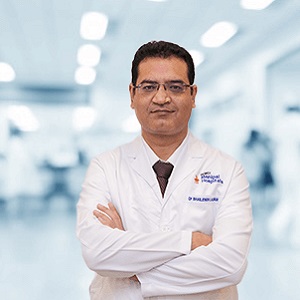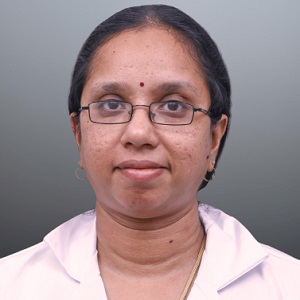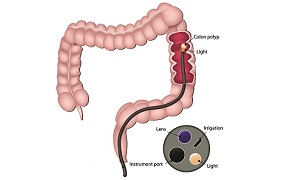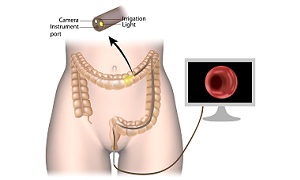Best Doctors in India for Rectal Cancer Treatment
- Gastroenterologist, Gurugram, India
- Over 33 years’ experience
Profile Highlights:
- Dr. Arvind Kumar Khurana is a well-known name in the field of gastroenterology and has a keen interest in Gastroenterology, Hepatology, Endoscopy, Onco-Gastroenterology, and Endoscopic Ultrasound.
- Dr. Khurana has successfully performed over 1,50,000 Endoscopic procedures, including over 20000 cases of EPT/CBD stones removal & Biliary Stenting, 2000 metallic stenting, 950 cases of foreign body removal, and 2000 PEG cases.
- Gastroenterologist, Gurugram, India
- Over 17 years’ experience
Profile Highlights:
- Dr. M A Mir is a well-known Gastroenterologist and Endoscopist with a vast experience of more than 17 years in the field of Gastroenterology.
- Before joining Artemis Hospital he was associated with Pushpawati Singhania Research Institute for Liver and Digestive Diseases, New Delhi as a Consultant Gastroenterologist and Endoscopist.
- He is experienced in all gastrointestinal procedures such as diagnostic and therapeutic upper and lower GI endoscopies.
- Liver Transplant & HPB Surgeon, Gurugram, India
- Over 20 years’ experience
Profile Highlights:
- Dr. Ajitabh Srivastava is a reputed HPB and Liver Transplant surgeon in India.
- He has been a key member of teams that performed over 1500 liver transplants including living donors, deceased donors, pediatric transplants, and combined liver and kidney transplants.
- He is an expert in other complex procedures involving hepatobiliary surgery, combined liver, and Kidney Transplant, and vascular access surgery.
- Gastroenterologist & Hepatologist, New Delhi, India
- Over 30 years experience
Profile Highlights:
- Dr. Amitabha Dutta is a renowned Gastroenterologist and Hepatologist with 10 years of experience as a specialist. He has more than 30 years of professional experience in gastroenterology and general medicine.
- After practicing for 10 years in the UK, Dr. Dutta relocated to India and joined Apollo Hospitals in 1995. He was the one to set up the Gastroenterology department at Apollo Hospital, and he continues to work as a senior consultant in the Department of Gastroenterology and Hepatology at Indraprastha Apollo Hospital.
- Dr. Amitabha Dutta offers non-surgical treatment for various issues ranging from piles, skin tags, and acidity to Ulcerative Colitis and the current Coronavirus outbreak.
- He got MRCP certification from The Royal College of Physicians Of Ireland.
- Surgical Gastroenterologist, Liver Transplant Surgeon, New Delhi, India
- Over 18 years experience
Profile Highlights:
- Dr. Neerav Goyal is one of the best Liver transplant surgeons in India. He is the Head of the Apollo Liver Transplant, Hepatobiliary, and Pancreatic Surgery unit in New Delhi.
- Dr. Neerav Goyal is providing the best care to patients with Hepatectomy/ liver transplant in case of liver cancer or liver cirrhosis, surgeries for pancreatic cancer, etc.
- He is a Gold Medalist practitioner who performs complex surgeries with success.
- Dr. Goyal has performed over 2100 liver transplants in his 18 years of experience. This also includes 500+ cadaver liver transplants and 220 pediatric liver transplants.
- Gastroenterologist and Hepatologist, New Delhi, India
- Over 24 years’ experience
Profile Highlights:
- Dr. Abhishek Deo is one of the finest Gastroenterologists and Hepatologists in India with an outstanding experience of over 24 years.
- His clinical proficiency lies in the field of Gastroenterology, Liver Disease, Diagnostic Therapeutic Endoscopy, and Advanced Therapeutic Endoscopy procedures.
- After completing the initial 14 years of working hand-in-hand with the top gastroenterologists in UK, he returned back to India in 2010 and started his practice in Gastroenterology and General Medicines.
- Medical Gastroenterologist, Hepatologist, New Delhi, India
- Over 35 years experience
Profile Highlights:
- Dr. Sanjay Sikka is a general physician who specializes in medical gastroenterology. He is a gastroenterologist and hepatologist with over 32 years of experience in liver disease, therapeutic endoscopy, and gastrointestinal consultations.
- Dr. Sikka is practicing as a senior consultant in the Gastroenterology department at Indraprastha Apollo Hospitals, New Delhi.
- Being Professor at the GSUM Medical College in Kanpur, Dr. Sanjay Sikka was also involved in scholarly activity. He has several papers that appeared in numerous national and international periodicals.
- Liver Transplant Surgeon & HPB Surgeon, New Delhi, India
- Over 20 years’ experience
Profile Highlights:
- Dr. Bhushan Bhole is a well-known Liver Transplant Surgeon & HPB Surgeon who has done Advanced Fellowship in Liver Transplantation & Fellowship in Advanced Laparoscopic Surgery, in Birmingham, UK.
- He is an active member of several national surgical associations such as ASI, IASG, IHPBA, ACRSI, MAS, IAGES, IHA & IMA. He has also been awarded many fellowships like FACRSI, IAGES & FMAS.
- Liver Transplant Surgeon & HPB Surgeon, New Delhi, India
- Over 19 years’ experience
Profile Highlights:
- Dr. Shailendra Lalwani is a renowned gastroenterologist at Manipal Hospitals, Dwarka, New Delhi, who has over 19 years of experience as a specialist. His expertise lies in Liver Transplantation and Hepato-pancreatic biliary surgery.
- For his outstanding contributions to the field of gastroenterology, Dr. Shailendra Lalwani has been honored with several awards and recognition. He is also an active member of the Delhi Medical Council.
- Gastroenterologist, Chennai, India
- Over 13 years’ experience
Profile Highlights:
- Dr. M Tarakeshwari is a well-known gastroenterologist who provides various services to her patients and is an expert in cytokines in IBS, treating Hepatitis B in pregnancy as well as renal failure in Cirrhosis.
- Some of the services provided by the Dr. M Tarakeshwari are: Acidity Treatment, Gallbladder (Biliary) Stone Treatment, Bladder Cancer Surgery, Inflammatory Bowel Disease (IBD) Treatment Ulcerative Colitis Treatment, etc
Best Hospitals in India for Rectal Cancer Treatment
CARE Hospitals, Hyderabad
- City: Hyderabad, India
Hospital Highlights:
- CARE Hospitals were established in the year 2000, by CARE Group.
- The multispecialty hospital has 435 beds, including 120 critical care beds, with an annual inflow of 180000 outpatients and 16,000 in-patients.
- The hospital provides specialty medical services in Cardiology, Cardiothoracic Surgery, Pediatric Cardiology, Pediatric Cardiothoracic Surgery, Neurology, Neurosurgery, Nephrology, and Urology.
- The hospital has the first dual source, 128 slice CT scanner (for high precision cardiac imaging) – the first of its kind in south India.
- The hospital offers a wide range of accommodation facilities for the convenience of its varied patient base, ranging from general wards to super deluxe rooms.
Fortis Hiranandani Hospital, Mumbai
- City: Mumbai, India
Hospital Highlights:
- Fortis Hiranandani hospital was established in 2007.
- The hospital is an advanced tertiary care, multi-specialty hospital equipped with 149 beds.
- The hospital is equipped with a super ICU to provide emergency medical care to critically ill patients.
- The hospital is NABH accredited.
- The critical care facility in the hospital is augmented with the state-of-the-art facilities that facilitate speedier diagnosis and efficient monitoring.
- The hospital provides specialty medical services in cardiology, orthopedic science, pediatric science, neurology, diabetic care, urology, nephrology, ENT, obstetrics, gynecology, cosmetic surgery, bariatric surgery, neuro and spine care.
Fortis Hospital, Anandpur, Kolkata
- City: Kolkata, India
Hospital Highlights:
- Fortis Hospital, Anandapur, Kolkata is a world-class super-speciality equipped with the latest technologies in the medical world.
- The hospital is NABH accredited.
- This state-of-the-art facility specializes in cardiology and cardiac surgery, urology, nephrology, neurosciences, orthopaedics, digestive care, emergency care and critical care.
- The hospital, governed by integrated Building Management System (IBMS), has a pneumatic chute system, for quick vertical and horizontal transportation between floors, facilitating speedy transfer of patient specimens, documents, reports, and medicines to the concerned departments.
- The hospital also has a nephrology department with over 28 advanced dialysis units.
Fortis Hospital Banerghatta, Bengaluru
- City: Bengaluru, India
Hospital Highlights:
- Fortis Hospital Bannerghatta, Bengaluru was established in 2006.
- The hospital is a 276 bedded multi-specialty tertiary care facility.
- The hospital specializes in cutting-edge medical technology and dedicated patient care services.
- The hospital is equipped with state-of-the-art technologies like trans-radial angioplasty, trans-abdominal cardiac surgery, and computerized TKR navigation surgery.
- The hospital provides specialty medical services in cardiology, cardiac surgery, orthopedics, neurology, neuro-surgery, GI, and Minimal Access Surgery (MAS).
Gleneagles Global Hospital, Parel, Mumbai
- City: Mumbai, India
Hospital Highlights:
- Gleneagles Global Hospital The 450-bed facility comprises of 17-stories, housing state-of-the-art infrastructure, and advanced medical care facilities.
- The hospital offers end-to-end clinical, surgical, and diagnostic services. It is equipped with a team of eminent medical professionals aided by qualified nurses and medical staff
- The Hospital offers advanced Endoscopic procedures, Hepatobiliary and Liver Surgeries, Surgical and Medical Gastroenterology, Bariatric Surgery, and Robotic surgery.
- The hospital is a center of excellence for Orthopedics, Joint Replacement, Knee Replacement, and Hip Replacement surgery.
Jaypee Hospital, Noida
- City: Noida, India
Hospital Highlights:
- Jaypee Hospital is the flagship hospital of the Jaypee Group.
- This hospital has commissioned 525 beds in the first phase and has been planned and designed as a 1200 bedded multi-specialty facility.
- It holds the accreditation of the NABH and NABL.
- The hospital has state-of-the-art infrastructure equipped with the latest technologies and modern equipment like 64 Slice PET CT, Dual Head 6 Slice SPECT CT, Gamma Camera, and Da Vinci Robotic Surgery for comprehensive robotic surgical solutions.
- It has special Centers dedicated to the major specialties to provide hassle-free and high-quality clinical care.
Manipal Hospital, Dwarka, Delhi
- City: New Delhi, India
Hospital Highlights:
- Manipal Hospitals, Dwarka, is a super-specialty hospital in Dwarka, New Delhi, which is a part of Manipal Hospitals Group.
- The hospital aims to provide the best treatment on par with international standards at a fraction of the cost.
- Equipped with 380 beds, the hospital is also one of the new age hospitals which are equipped fully with state-of-the-art infrastructure, cutting-edge technology as well as the latest and advanced clinical practices. The hospital also has 13 modular Operation theatres with 118 beds which are solely meant for critical care.
- The hospital comprises internationally acclaimed doctors and highly professional and experienced hospital and medical staff who are able to provide preventive, therapeutic, and diagnostic services all under one roof.
Pushpawati Singhania Hospital & Research Institute, New Delhi
- City: New Delhi, India
Hospital Highlights:
- Established in 1996, Pushpawati Singhania Research Institute is one of the top hospitals in the NCR region, as well as one of the top facilities in India for gastroenterology. The hospital is one of South Asia’s first institutes in medical and surgical treatment for diseases related to digestion.
- The hospital is equipped with state-of-the art facilities coupled with the latest equipment as well as renowned consultants from various parts of India as well as other parts of the world.
W Pratiksha Hospital, Gurgaon
- City: Gurugram, India
Hospital Highlights:
- W Pratiksha Hospital, Gurugram, is one of the best hospitals in the NCR region. It is also a top hospital in India for IVF. Since its inception, the hospital has performed over 5500 successful IVFs. The hospital also specializes in gynecology.
- With over 20 years of experience in providing quality healthcare, the hospital is known as one of the most trusted and valued health providers in India.
- Equipped with world-class medical facilities and advanced technology, the hospital’s doctors and clinicians also have a track record of delivering excellent results. The hospital is also known for focusing on preventive well-being as much as on curative treatment.
- The hospital has earned the trust of its patients, by providing the best available treatments at affordable costs.
Narayana Superspeciality Hospital, Gurugram
- City: Gurugram, India
Hospital Highlights:
- Situated near DLF Cyber City, Gurugram, Narayana Superspecialty Hospital is one of the top medical facilities in the Delhi NCR region, catering to the needs of the people. Known for its commitment to quality medical care and patient service, the hospital is a state-of-the-art facility with planned and well-equipped sections, which includes a spacious OPD area as well as comfortable patient rooms.
- It is the closest super-specialty hospital from Indira Gandhi International Airport towards Gurugram, and also the nearest super specialty hospital from DLF Cyber City. It is also close to major residential areas in Gurugram.
- It is part of the renowned Narayana Health Group. Established in 2000, by Dr. Devi Shetty, a renowned cardiac surgeon, it has grown to be one fo India’s leading healthcare groups.
Rectal Cancer
Rectal Cancer is a type of cancer that develops in the cells of the rectum. Your rectum is located below the sigmoid colon, above your anus. Cancer inside the rectum (known as rectal cancer) and inside the colon (known as colon cancer) are usually referred to together as colorectal cancer. Across, the world, colorectal cancer is the second most common cancer among females and the third most common among males.
Although in the past, people with rectal cancer mostly did not survive for the long-term, thanks to advanced treatment in the past few decades, the survival rates among people having rectal cancer have improved drastically.
Symptoms
In the early stages, rectal cancer might show no obvious symptoms. As the disease continues to develop, symptoms can include changes in bowel movement, rectal bleeding, as well as a thin stool. There might be other signs and symptoms as well, such as:
- Fatigue
- Weight Loss
- Blood in the stool
- Diarrhea and/or constipation
- Bloating
- Abdominal Pain
- A feeling of being unable to empty the bowels
If your cancer metastasizes or spreads to other body parts, then symptoms can vary depending on where in the body your cancer is located. Some of the symptoms of metastatic rectal cancer include:
- Persistent cough
- Shortness of breath
- Loss of appetite
- Fatigue
- Bone pain
- Jaundice
- Swelling in the hands and feet
- Changes in vision or speech
Causes
Rectal cancer begins when your body’s healthy cells in the rectum develop changes or mutations in their DNA. A cell’s DNA contains all instructions that instruct it what to do.
These changes instruct the cells to grow uncontrollably and to continue living, whereas healthy cells would die normally. These accumulating cells can become a tumor. Within time, the cancer cells might grow to invade and destroy any healthy tissue nearby. And cancerous cells can break away and travel i.e. metastasize to any other parts of the body.
Generally, for most rectal cancers, it is unclear what leads to the mutations that cause cancer to form.
There are some inherited gene mutations as well, which can increase the risk of this cancer. One of these is known as Lynch syndrome. This disorder can raise the risk of colon and other cancers, especially before the age of 50.
Another such syndrome that increases the risk of rectal cancer is familial adenomatous polyposis. This disorder that can cause polyps in the lining of the colon and rectum is usually rare. Without treatment, it may increase the risk of colon or rectal cancer, especially before the age of 40.
Other risk factors for rectal cancer are:
- Age- Diagnosis usually occurs after the age of 50, although rates are increasing among younger people.
- Family history- Personal or family history of colorectal cancer can also increase risk.
- Race- African Americans are at a higher risk than other ethnicities of developing rectal cancer.
- Radiation therapy– If you have undergone radiation therapy in the abdominal area, it might increase risk.
Other conditions that may increase risk include:
- Ovarian cancer
- Obesity
- Polyps
- Inflammatory bowel disease
- Type 2 diabetes that’s not well managed
Some lifestyle factors can sometimes play a role in colorectal cancer as well:
- Diet with too few vegetables and too much red meat
- Smoking
- Lack of exercise
- Consuming over three alcoholic drinks a week
Diagnosis
Your doctor is most likely going to begin by first taking your medical history. Then he/she will need to perform a physical examination.
Sigmoidoscopy
Next, a fecal immunochemical test or a sigmoidoscopy might also be recommended. If these steps are positive for cancer, the next step is going to be a colonoscopy.
Colonoscopy
A colonoscopy involves your doctor using a thin tube with a light and a camera at the end to view the inside of your rectum and colon. They are usually able to remove any polyps they can find at this time. During this test, your doctor can also collect tissue samples for later examination in a lab. These samples can be viewed under a microscope to determine if they are cancerous. They may also be tested for genetic mutations that are associated with colorectal cancer.
Blood test
Ultrasound
Once your doctor is able to confirm the diagnosis, the next step is going to involve determining how far it might have spread.
Your doctor might use an endorectal ultrasound in order to examine your rectum and its surrounding area. For this, your doctor will need to insert a probe into your rectum to produce a sonogram, a type of image.
Imaging tests
Your doctor might need to use other imaging tests as well, such as an X-ray or an MRI, to look for any signs of cancer throughout the body.
Treatment
Treatment for rectal cancer generally involves a combination of therapies. When possible, surgery is used to remove or cut away the cancer cells. Other treatments such as chemotherapy, and radiation therapy, might be used after the surgery, to kill any cancer cells that remain as well as reduce the risk that the cancer is going to return.
If the surgeons are concerned that your cancer is not removable completely, without hurting any nearby organs, then a combination of radiation therapy and chemotherapy might be recommended initially. These kinds of treatments can help in shrinking the cancer cells and make them easier to remove during the operation.
Surgery
Surgery is generally the most common and preferred method for removing the cancer cells. There are various kinds of surgeries that may be performed, depending on the location and stage of cancer, how aggressive the cells are, as well as your overall health, and your preferences.
The surgery can be of various types, including any of the following:
Removing very small cancers from the inside of the rectum
Very small rectal cancers can be removed with the help of a colonoscope or a specialized type of scope inserted through the anus. Surgical tools can be passed through the scope for cutting away cancer and some of the healthy tissue around it.
If your cancer is small and unlikely to spread to any nearby lymph nodes, then this procedure is an option. If a lab analysis indicates that your cancer cells are aggressive or more likely to spread to the lymph nodes, then it is likely that your doctor is going to recommend additional surgery.
Removing all or part of the rectum
This might be required for larger rectal cancers that are far enough away from the anal canal. It involves the removal of any nearby tissue and lymph nodes as well. This procedure can help in preserving the anus so that the waste is able to leave the body normally.
How this procedure will be performed, is going to depend on the location of the cancer. If your cancer is affecting the upper portion of the rectum, then this part of the rectum is removed, after which the colon is attached to the remaining rectum. All of the rectum might require removal as well if the cancer is located in the lower portion of the rectum. Then the colon is shaped into a pouch after which it is attached to the anus.
Removing the rectum and anus
If your rectal cancer is located near the anus, it might be not possible to remove cancer completely without damaging the muscles that control the bowel movements. In these situations, surgeons may recommend an operation which is termed abdominoperineal resection (APR). This involves removing the rectum, anus as well as some of the colon, and its nearby tissue and lymph nodes.
The surgeon then creates an opening in the abdomen and attaches the remaining colon to it. Waste is able to leave your body through this opening and collects in a bag attached to the abdomen.
Radiation therapy
Radiation therapy involves using powerful energy beams, such as X-rays and protons, to kill the cancer cells. In people who are suffering from rectal cancer, radiation therapy can also be combined with chemotherapy as it can make the cancer cells more likely to be damaged by radiation. It may be used after surgery as well, to kill any cancer cells that are remaining. It can be used before surgery as well, to shrink cancer, making it easier to remove.
Radiation therapy can also help in relieving symptoms like pain.
Chemotherapy
Chemotherapy involves using drugs to destroy cancer cells. For rectal cancer, chemotherapy might also be recommended after surgery in order to kill any cancer cells that are remaining.
Chemotherapy can also be combined with radiation therapy might before an operation to shrink large cancer so that it becomes easy removing it with surgery.
Chemotherapy may also be used to relieve symptoms of rectal cancer which is not removable with surgery.
Targeted drug therapy
Targeted drug treatments are meant to focus on specific abnormalities that exist within cancer cells. When these abnormalities are blocked, targeted drug treatments can lead to the death of the other cancer cells.
Targeted drugs are generally combined with chemotherapy. Generally, they are reserved for people having advanced rectal cancer.
Immunotherapy
Immunotherapy is a drug treatment that strengthens your immune system to fight cancer. Your body’s immune system might not attack your cancer as the cancer cells produce proteins and these hide them from the immune system cells. Immunotherapy can help to interfere with that process.
Immunotherapy is also generally reserved for advanced rectal cancer.
Prevention
Exercising for at least 30 minutes a day can help to increase the risk of rectal cancer. Eating a variety of fruits, vegetables, whole grains, and maintaining a healthy weight, can also help.
If you are a smoker, it is important to stop. If you choose to drink alcohol, drink it in moderation. For women, it should not exceed one drink a day, and for men, it shouldn’t exceed two.

